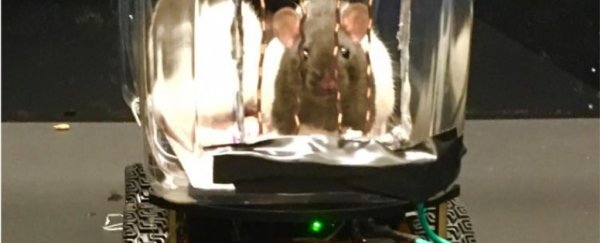Rats in a University of Richmond lab have learned to do something many Americans struggle with every day: successfully drive themselves to pick up food.
The furry drivers were taught to navigate a custom-built rat car and the findings suggest rats may possess a greater ability to learn tasks than previously thought.
The experiment, first reported on by New Scientist, was the brainchild of the University of Richmond neuroscientist Kelly Lambert.
Lambert and her colleagues created a tiny car out of an empty food container and retrofitted it with an aluminium bar and three copper bars for a steering wheel.
The copper bar steering wheel and aluminium floor create an electrical current that can propel the car forward. The rats, when properly trained, could control the direction of the car by gripping the left, middle, or right copper bar with their tiny little paws.
The scientists trained the rats by constantly rewarding them with Froot Loops every time they touched and moved the plastic car forward.
Eventually, the scientist went a step further and created a 4 square metre rectangular box for the rats to drive around in.
The team gradually placed the Fruit Loops further and further away, encouraging the rats to fine-tune their driving.
"They learned to navigate the car in unique ways and engaged in steering patterns they had never used to eventually arrive at the reward," Lambert told New Scientist.
 (Kelly Lambert/University of Richmond)
(Kelly Lambert/University of Richmond)
Not all of the 11 male and 6 female rats in the experiment learned the same way. In an email sent to Insider, Lambert said the type of environment the rats were surrounded by affected the way they learned.
The rats that lived in a complex, stimulating environment learned how to drive significantly faster than those living in dreary, boring laboratory settings.
"Those data suggest that we gain "experiential capital" if we have challenging, dynamic lifestyles that transfer to learning acquisition," Lambert said.
Lambert said it appears as if the act of driving actually relaxed the rats. Like humans, Lambert said the rats seem to have received some satisfaction out of mastering a difficult task. But then again, unlike humans, the rats didn't have to deal with traffic.
While you won't find rats driving around on city streets anytime soon, Lambert and her fellow scientists said the experiment was significant because it suggests that rats' neuroplasticity - the ability for their brain to adapt and learn new tasks - may be far greater than people once thought.
 (Kelly Lambert/University of Richmond)
(Kelly Lambert/University of Richmond)
The driving test is just the start. Lambert told New Scientist she believes the tests could be made more complex and that the data gathered from observing the rats could potentially be used to help study the effects of Parkinson's disease and depression.
Above all else, the findings were a win for team rat.
"I do believe that rats are smarter than most people perceive them to be and that most animals are smarter in unique ways than we think," Lambert said.
You can watch a video of the driving rodents here.
This article was originally published by Business Insider.
More from Business Insider:
